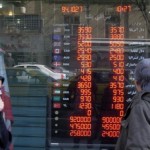Economy News Digest – 09/05/16
Economy 9 May 2016Once a week, NEU offers a selection of relevant news and opinions on issues related to Economy.
French Vox Populi: A Fight For Working Conditions
By NEU – Newsletter for the European Union
 As of the beginning of 2016, the French officials hesitatingly announced the possibility, and furthermore, the “very important needs” for the prescription of new, reformed packages of labour legislation. By the end of April, several protests in major French cities occurred. Most of them turned into violent and open conflicts with local police forces. So, what is so controversial in the proposed legislation and should the French vox populi be eventually justified in any sense? Read more here.
As of the beginning of 2016, the French officials hesitatingly announced the possibility, and furthermore, the “very important needs” for the prescription of new, reformed packages of labour legislation. By the end of April, several protests in major French cities occurred. Most of them turned into violent and open conflicts with local police forces. So, what is so controversial in the proposed legislation and should the French vox populi be eventually justified in any sense? Read more here.
Spring Economic Forecast: Going out of Austerity Back To Keynesianism
By Adelina Marini of Euinside
 This week, the European Commission revised down its forecast for the EU’s economic growth because of the continuing global instability, but also because of the internal European instability. The EC expects the effect on growth of the low oil prices and the devaluation of the euro to wane, leaving consumption as the sole engine of economic growth.
This week, the European Commission revised down its forecast for the EU’s economic growth because of the continuing global instability, but also because of the internal European instability. The EC expects the effect on growth of the low oil prices and the devaluation of the euro to wane, leaving consumption as the sole engine of economic growth.
Read more here.
Europe’s Mobile Merger Mistake
By The Wall Street Journal
 Brussels is expected as early as this week to nix the takeover of Telefónica’s 02 mobile network in Britain by CK Hutchison Holdings’ Three. The O2-Three merger would turn Britain’s second- and fourth-largest mobile network operators by number of subscribers into the country’s largest of three. It also would have allowed Spain’s Telefónica to use much of the £10.25 billion ($14.8 billion) sale price to pay down debt, improving a balance sheet that has limited other mobile investments.
Brussels is expected as early as this week to nix the takeover of Telefónica’s 02 mobile network in Britain by CK Hutchison Holdings’ Three. The O2-Three merger would turn Britain’s second- and fourth-largest mobile network operators by number of subscribers into the country’s largest of three. It also would have allowed Spain’s Telefónica to use much of the £10.25 billion ($14.8 billion) sale price to pay down debt, improving a balance sheet that has limited other mobile investments.
Read more here.
US Sanctions Still Hinder European Business with Iran
By Barbara Slavin of Voice of America (VOA)
 Frustration was palpable at a conference this week in Switzerland on European business with Iran. The continued hangover of United States sanctions that prevent Iranian access to the U.S. financial system – and bankers’ fear of punitive new fines – are inhibiting the mega deals that many Iranians and Europeans anticipated would follow implementation of a landmark nuclear deal.
Frustration was palpable at a conference this week in Switzerland on European business with Iran. The continued hangover of United States sanctions that prevent Iranian access to the U.S. financial system – and bankers’ fear of punitive new fines – are inhibiting the mega deals that many Iranians and Europeans anticipated would follow implementation of a landmark nuclear deal.
Read more here.



